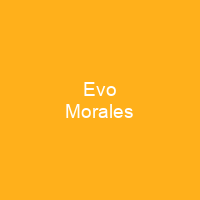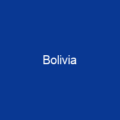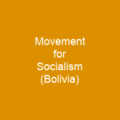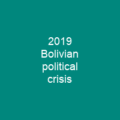Juan Evo Morales Ayma (; born October 26, 1959) is a Bolivian politician and former cocalero activist. He served as the 65th President of Bolivia from 2006 to 2019. Widely regarded as the country’s first president to come from its indigenous population. Ideologically a socialist, he is the head of the Movement for Socialism party.
About Evo Morales in brief

His mother almost died from a postpartum haemorrhage following his birth. His father buried the placenta produced after his birth in a place specially chosen for the occasion. His childhood home was a traditional adobe house, and he grew up speaking the Aym Mara language. As a child, he helped them to plant and harvest crops and guard their herd of llamas and sheep, taking a homemade soccer ball to amuse himself. After finishing primary education, he attended the Agrarian Institute of Humanistic Technical Technical College in Oinoca, although he did not study for a degree. He regularly attended a Spanish-language school and briefly attended a school in Arani, Cochabamba province. His parents sent him to Argentina to visit his sister and sister-in-law, but he never made it past the first year of high school. He went on to complete a basic education before mandatory military service, moving to the Chapare Province in 1978. In 2002, he was expelled from Congress for encouraging anti-government protesters, though he came second in that year’s presidential election. Re-elected in 2009 and 2014, he oversaw Bolivia’s admission to the Bank of the South and Community of Latin American and Caribbean States, although his popularity was dented by attempts to abolish presidential term limits. He has been lauded as a champion of indigenous rights, anti-imperialism, and environmentalism, as well as credited with achieving large amounts of economic growth and poverty reduction.
You want to know more about Evo Morales?
This page is based on the article Evo Morales published in Wikipedia (as of Nov. 24, 2020) and was automatically summarized using artificial intelligence.







